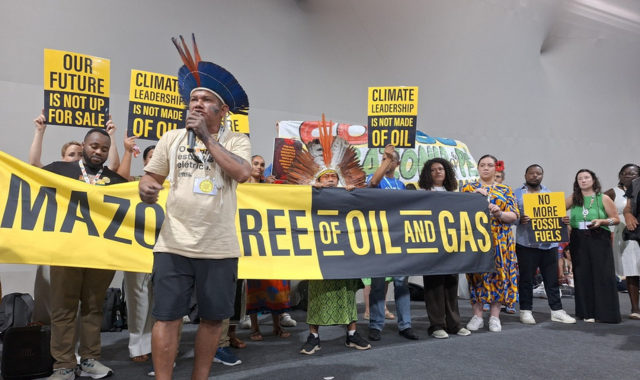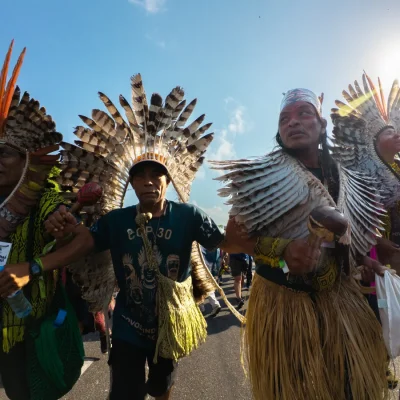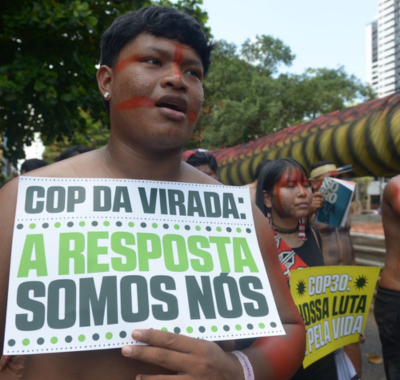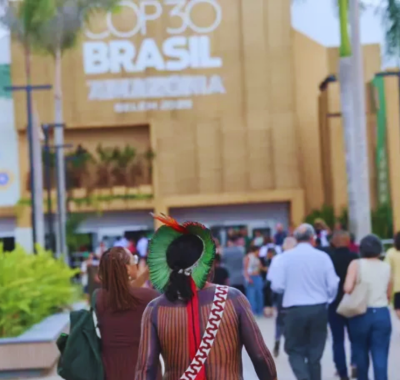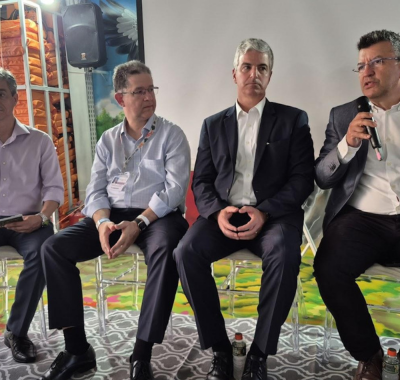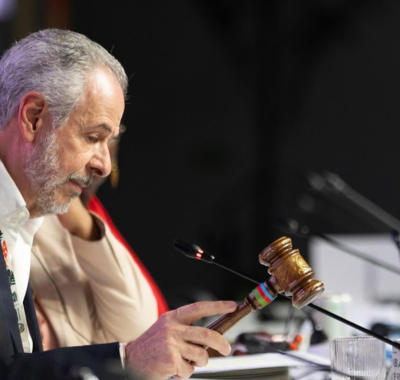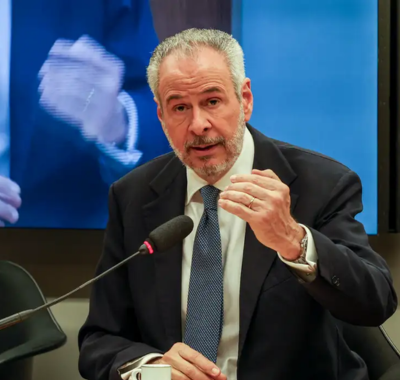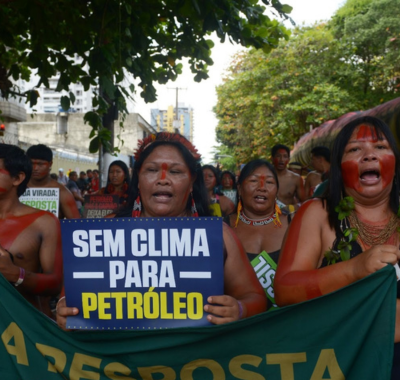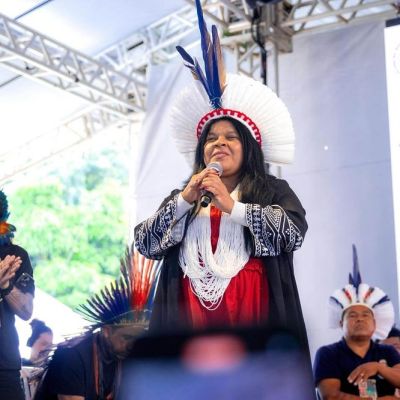While oil companies’ representatives circulate at the conference, protesters demonstrate against oil in the Amazon
Author: Isabel Seta
Edition: Bruno Fonseca
Translation: Roberto Cataldo/Verso Tradutores
Once again, lobbyists for the fossil fuel industry have managed to register in large numbers for COP30. More than 1,600 are accredited for the conference – a figure that surpasses the size of the delegations from all countries, except Brazil, which, as the host country, has 3,805 participants.
This means that one in every 25 people accredited for COP30 represents the interests of the fossil fuel industry – the main culprit behind global warming.
This is a new record, as shown by a survey conducted by Kick Big Polluters Out, a coalition of more than 450 organizations from all over the world that counts representatives from fossil fuel companies and associations at UN Climate Conferences.
While lobbyists flock to the conference, activists organized a demonstration against oil exploration in the Amazon this Thursday, November 13.
“The Amazon free of oil and gas,” read a large banner displayed by protesters in the middle of one of the corridors in the so-called “blue zone”, the conference area where diplomatic negotiations take place and access is restricted to accredited individuals.
“We expected the COP to be an answer for us, but not like this. If there’s a COP in Brazil, it should give a favorable response to Indigenous Peoples, but they gave this bad news about oil exploration at the mouth of the Amazon river,” Chief Jonas Mura, from the Gavião Real village in Amazonas, which is threatened by gas exploration, told Agência Pública.
Mura, who participated in the demonstration, was referring to the license granted by IBAMA to Petrobras a few days before the start of COP30, authorizing it to drill a test well 175 km off the coast of Amapá, at the mouth of the Amazon River. The area is inhabited by dozens of traditional people, including Indigenous People, quilombola communities, small-scale fishermen, and riverine dwellers of high ecological sensitivity. On the banks of the river mouth lies the world’s largest mangrove corridor, while little-known coral reefs are in the sea.
Petrobras and other oil companies are accredited participants
Among the representatives of oil producers, Pública counted 11 Petrobras employees registered for COP30 as “host country guests,” that is, Brazil. In addition, five other names were registered as party overflow of the Brazilian delegation – a category that grants access to behind-the-scenes diplomatic negotiations.
Most are second-level management such as directors, managers, and members of the communications team – including one person registered as “crisis communications coordinator.” The company’s president Magda Chambriard, for example, is not on the list of COP30 participants.
Being registered does not mean the person actually came to Belém. For now, the UN Framework Convention on Climate Change (UNFCCC), which organizes the conference, has not disclosed the list of all names accredited for the COP.
Kick Big Polluters Out’s survey released this Friday, November 14, points out that 599 fossil fuel industry representatives were granted access as party overflow. Among them, Pública also found two names from Norwegian oil company Equinor Brasil registered as members of the Norwegian delegation and two others identified as “CNPC Brasil” in the Chinese delegation.
CNPC Brasil, a subsidiary of China National Petroleum Corporation, was one of the companies granted exploration blocks at the mouth of the Amazon River in the auction held by Brazil’s National Petroleum Agency in June. At the time, a consortium formed by Chevron Brasil and CNPC Brasil won 10 blocks in the area. Ten more blocks were acquired by a consortium that includes Petrobras and ExxonMobil.
The US-based producer also secured two representatives in the Brazilian delegation, according to the COP30 list of participants.
This record presence of the fossil fuel industry comes at a time when countries are discussing the possibility of creating a “roadmap” to reduce the dependence of their economies on those fuels. The proposal was made by President Lula, both at the Climate Summit, which gathered world leaders in Belém, and in his opening speech at COP30, and has received positive signals from leaders of other countries.
COP30 and Brazil’s contradiction
“Brazil is a country full of contradictions,” said Stela Herschmann of the Climate Observatory during the demonstration against oil in the Amazon. Herschmann pointed to the fact that the same country that is able to reduce deforestation, decrease its greenhouse gas emissions, and propose a roadmap to transition away from fossil fuels also authorizes Petrobras to drill at the mouth of the Amazon River.
“Block 59 is just the beginning. There are almost 200 blocks at the river mouth; it’s a new exploration frontier that Brazil is opening,” she said.
The protesters argue that Brazil cannot position itself as a climate leader in diplomatic negotiations while internally giving the green light to more fossil fuel exploration.
“I want to send a message to the world. We, who are in the territory and in the communities, oppose exploration. This is not the development model we want for our country. It’s a failed model,” said Bianca Barbosa, a quilombola from Marajó, during the protest.
The demonstration quickly drew attention, and even diplomats from other countries approached to observe and record the speeches of traditional leaders and activists. Among them was Chumpi Washikiat from the Achuar Indigenous People of Ecuador, a country with significant oil exploration in the Amazon region. According to a report by (O)Eco, it is the Latin American country with the most indigenous lands affected by oil extraction.
“Exploration has brought no development whatsoever,” Chumpi told Pública. “All it brought was adverse impacts, diseases, poverty, roads that destroy the entire ecosystem.”
Lack of transparency in the “COP of truth”
Brazil was not the only country to include fossil fuel representatives in its official delegation. Japan, for example, registered 33 people from the industry while France included 22, according to the coalition’s survey.
“COP30 is supposed to be the ‘COP of truth,’ but more than 1,500 lobbyists continue to infiltrate national delegations. And more than half of them have concealed their affiliation,” said Brice Böhmer from Transparency International.
Böhmer mentioned the expression coined by Brazil’s President Lula da Silva to define this edition of the climate conference. “COP30 will be the COP of truth. In the age of disinformation, obscurantists reject not only scientific evidence but also the progress of multilateralism,” the President said in his opening speech.
After much pressure from social organizations, this is the first COP where participants who are not diplomats or ministers could disclose who is funding their participation when registering. However, about half (54%) of the fossil fuel industry representatives in the delegations either did not include this information or selected vague categories such as “guest” and “other.”
“If COP30 is indeed the COP of truth, the Presidency and Secretariat of the UNFCCC must now commit to reviewing and strengthening the rules for participant disclosure before future summits. It’s time to ensure integrity and accountability to restore trust,” Böhmer added.
Transparency International and other organizations advocate the exclusion of representatives of the fossil fuel industry from national delegations and, moreover, that they be prevented from influencing climate negotiations to avoid conflicts of interest.
—
This report was produced by Agência Pública, through the Collaborative Socio-environmental Coverage of COP 30. Read the original report at: https://apublica.org/2025/11/lobby-na-cop30-empresas-de-combustiveis-batem-recorde-em-belem/#_

